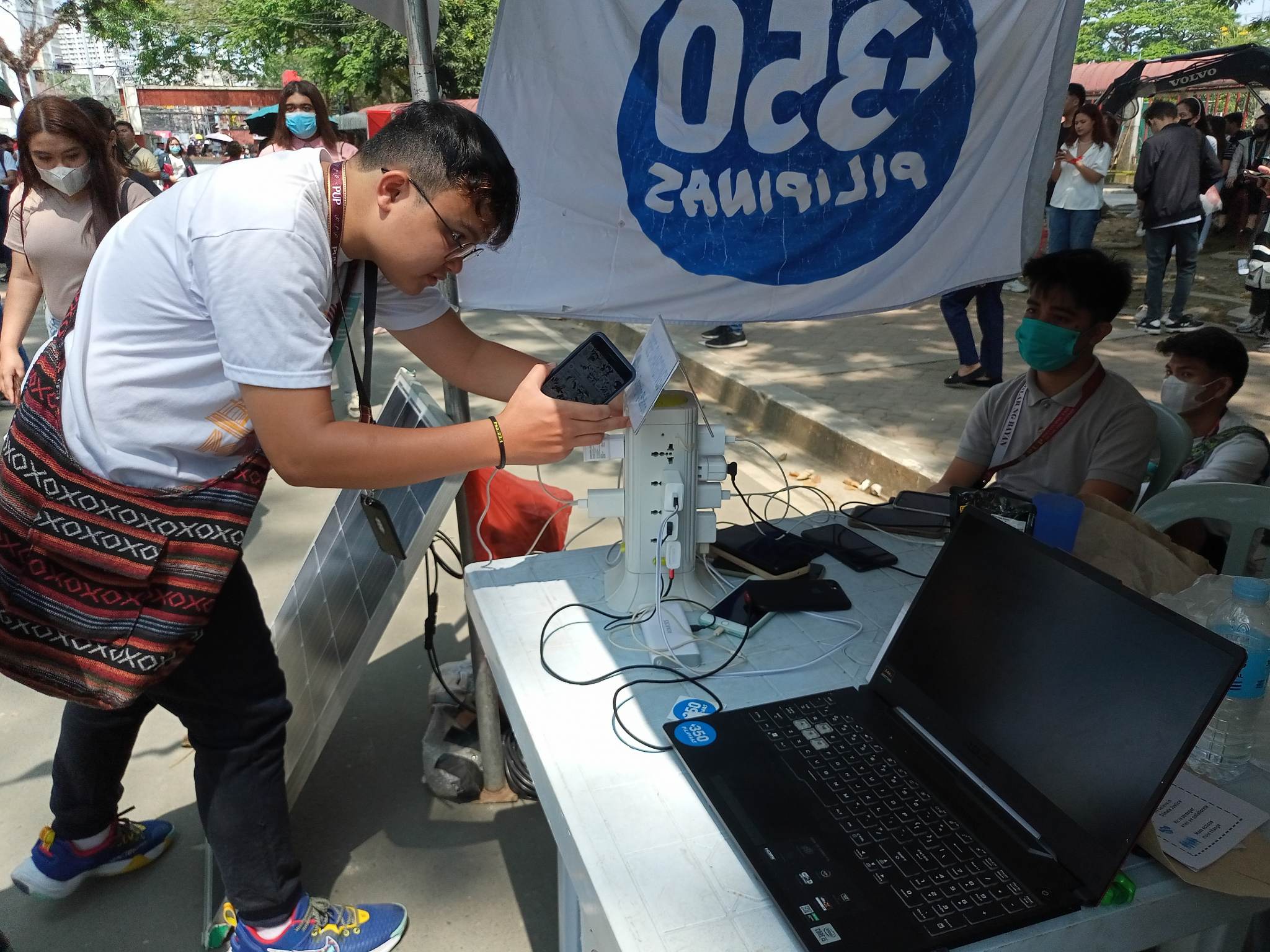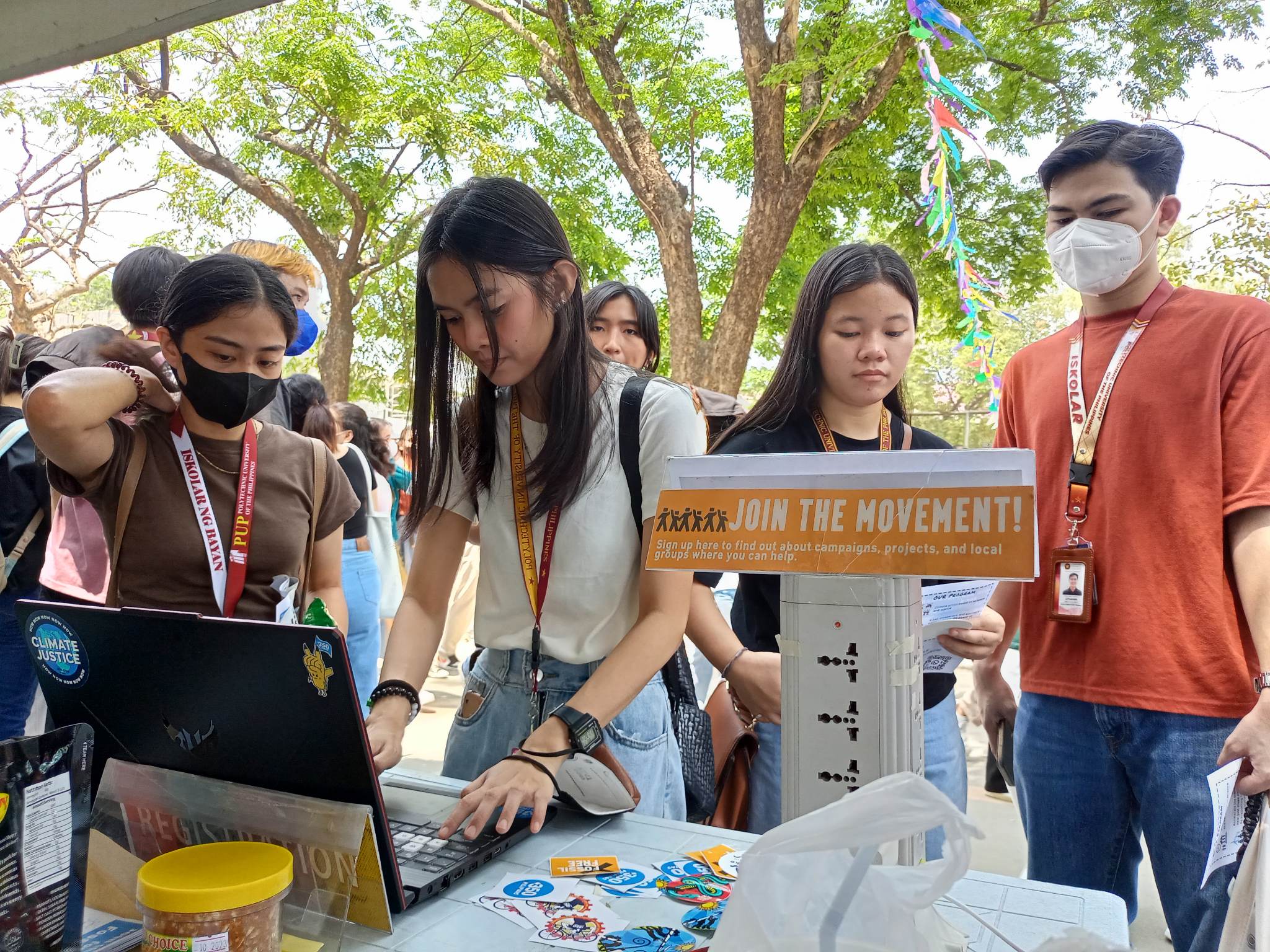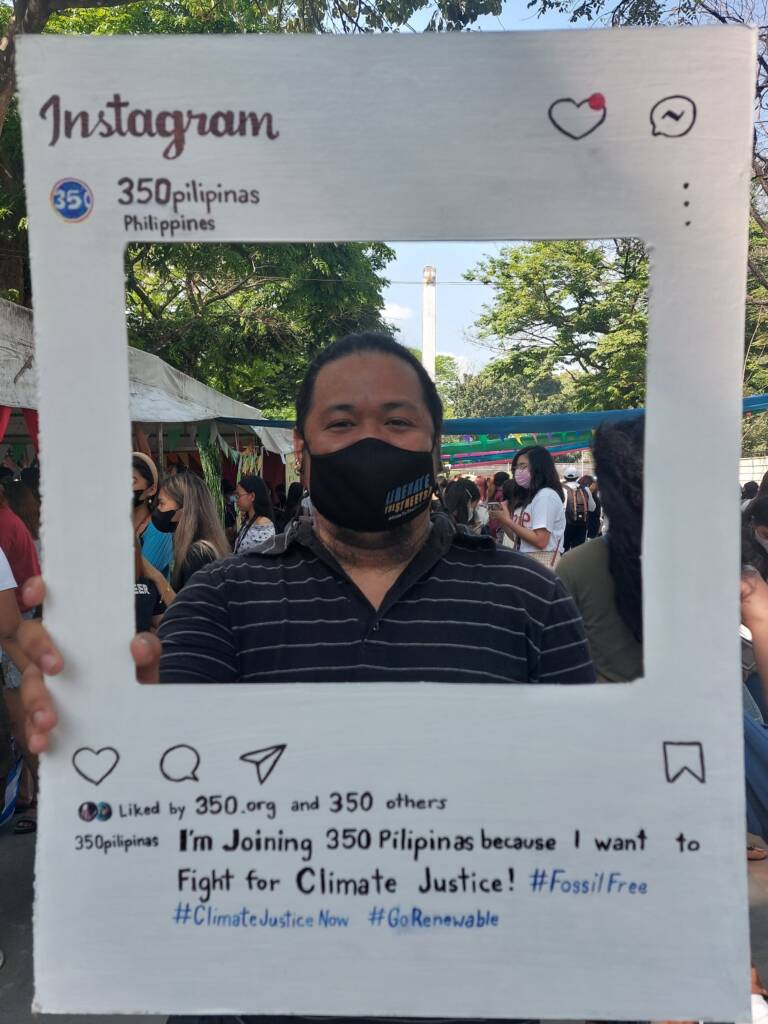Ara Alejo
Tanglaw Fest 2023, at the Polytechnic University of the Philippines (PUP) was like a homecoming of sorts.
I am back at the university that started my journey into activism, a continuing journey that has landed me into climate justice advocacy at 350 Pilipinas.
Tanglaw Fest is Sentral na Konseho ng Magaaral of PUP’s way to open up the first day of their second semester. This is their second round of their “Balik Sinta” Activity last October. It is also an Organization Fair. Various booths gathered from different organizations, traditional, religious, interest based, political and advocacy groups. There are games, selfie booths, stickers, advocacy and petition sign- ups, performances and speeches from different organizations.

A Tanglaw Fest installation banner that welcomed PUP students at the campus’ entrance. Photo: Ara Alejo
Through a partnership with PUP’s’ Center for Environmental Studies and Agham Youth-PUP we were given the opportunity to set up a booth to provide free solar-powered charging for the students’ mobile devices. We are able to provide them with opportunities to engage in climate action, as we said to the students “LIBRE lang makicharge, LIBRE naman yung araw!” (It’s free to charge your devices, because the sun is free)
For me, this is also a “Balik Sinta” moment, as I see many students and perceive activism still alive at the campus. I remember way back when I was still a student at the University, we didn’t have smartphones that could be used for studies. We only have those sturdy Nokia phones that would last up to one week without recharging. We only need to use electricity in our classes when we need to use an overhead projector for our reports or during cooking classes. When I was still a Food Technology Student, we didn’t use electricity often, we just mainly used some equipment such as electric mixers and ovens.
But now in the age of mobile technology, phones have the power of computers, not only as a tool for communicating but also in academics. Electricity or energy is vital in the studies of our new students.

Students plug-in to our solar-charger. Photo: Johnny Guarin
Many students that went in our booth to charge their phones and their camera batteries were surprised at how the solar genset was able to help in decarbonization. Not only are they excited about how beneficial it is for the students but how it can also help save the school’s energy consumption.
We observe the whole activity to be festive, many games and performances. Students also participated in activities on the booths of organizations. What striked me the most is every time a group of students passed by our booth we overheard comments like “Uy, Free Charging!” or “Uy, Solar o”. Indeed there is interest in power, there is interest for RE(Renewable Energy) and maybe there is interest in climate action.
We believe that university campuses play a key role in determining the trajectory of the immediate and long-term development direction of the country as these campuses function as microcosms of the current urban environments where decarbonization and building back better post-COVID 19 pandemic needs to take place.
Moreover, they function as the last bastions for critical thought and activism under the current political context, which has been integral in Philippine history where democratic movements against oppressive regimes have been borne out of student movements inside its halls.
Contemporary youth discourse around the climate emergency seems to emphasize two extremes in climate action as one puts primacy on high profile protests actions targeting world leaders for ambitious climate action, which is fair, but often seems too conceptual and distant for many young people because it speaks more about planetary survival.
While on the other hand, there is also a tendency to put the burden of action on the individual by calling on them to change their lifestyles and consumption patterns towards minimizing their individual carbon footprint or by encouraging support for technological innovations that are peddled as silver bullet solutions to climate change.
We like to think that there is a way to combine these elements in such a way that decarbonization and its co-benefits are integrated at the basic level —in their campus community.

Students sign up to become a part of the climate movement. Photo: Johnny Guarin
Organizing communities of practice centered around climate action and putting the enthusiasm of the youth sparked by the Global Climate Strikes into localized campaigns where displacement of carbon emissions can be measured and translated into savings made on energy consumption.
Putting in place, solutions based campaigns inside universities like, developing better infrastructure for active transport, easier access for bimodal commute, and setting up solar-powered charging stations that are accessible to students entails developing partnerships within the university administration, the academe and its student body towards climate action, which starts with capacitating students to run their own climate and energy campaigns that address both local/grassroot needs and contribute to reducing their campus’ carbon footprint.
Our goal is to emphasize that climate action and going fossil-free is a meaningful investment, not only because it guarantees our collective survival but also because it enables us to thrive in the face of the climate crisis.
Beyond that our hope is to provide pathways to develop youth-leadership in climate action where they are given the opportunity to enact changes that address a global crisis from the level of organizing collective action with empirically measurable results at the local level.
As a former PUPian our Hymn states “gagamitin ang karunungan, mula sayo, para sa bayan” (We will use the knowledge we learned from you, for the country). This is me going back to the university and helping new student leaders build collectives that would use their knowledge to bring back hope to people. This crisis we are facing is not a hopeless scenario, we can act now and start the change that we need.
In reaction to the acclaim given to her amidst the rise of the School Strike movement Greta Thunberg, emphasized the very core of why they are striking:
At the very core of our struggle is the need to reduce carbon emissions to prevent the worst impacts of climate change.

Ara Alejo, started his journey into activism as a student at the Polytechnic University of the Philippines, he currently serves as an Advocacy Officer for 350 Pilipinas’ campus organizing work that is pioneering on solutions based campaigning inside state universities.
